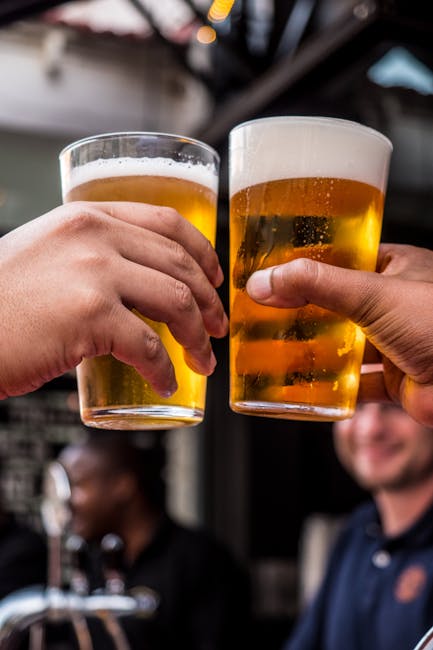Uncover Fascinating International Beer Trivia That Will Surprise Every Enthusiast
Introduction
Beer has been a beloved beverage for centuries, bridging cultures, traditions, and tastes. For enthusiasts looking to deepen their appreciation, there’s a treasure trove of fascinating international beer trivia waiting to be uncovered. Whether you’re a casual drinker or a seasoned connoisseur, these surprising facts about beer can enhance your knowledge and ignite conversations. So grab a pint, sit back, and let’s uncover fascinating international beer trivia that will surprise every enthusiast!
The Origins of Beer
Did you know that beer is one of the oldest beverages in human history? Archaeological evidence suggests that the Sumerians, dating back to around 5,000 BC in what is now Iraq, were brewing their own beer. They even had a goddess of brewing named Ninkasi! Ancient civilizations aside, this foundational beverage has laid the groundwork for many modern brewing techniques we enjoy today.
Beer and Its Various Styles
The world of beer is vast and diverse, encompassing a range of styles and flavors. From the hoppy bitterness of IPAs to the smooth sweetness of stouts, each type of beer reflects the culture and climate where it is brewed. For example, Belgian Trappist beers are brewed by monks in monasteries, while German beers often use distinctive brewing styles that date back centuries. Each country has its own special relationship with beer, underscoring its global importance.
The Beer Purity Law
If you’ve ever sipped a cold German lager, you might’ve unknowingly tasted something with a strict background. The Reinheitsgebot, or German Beer Purity Law, was enacted in 1516. This law dictated that only water, malt, hops, and yeast could be used in brewing beer. This regulation aimed to ensure the quality of beer, but it also showcased the Germans’ respect for ingredient integrity. Today, many breweries worldwide still pride themselves on following this age-old law, maintaining the spirit of authenticity in their brewing.
The First Craft Beer Movement
While craft beer seems like a recent trend, the movement actually has deep roots. The United States saw the craft beer phenomenon explode in the 1980s, but the first recorded craft brewery started operating in England in the late 1970s. The history of craft brewing is a testament to innovation and a passion for flavors that defy mass production, giving rise to diverse and exciting microbreweries worldwide.
Beer and Food Pairing
One of the fascinating aspects of beer is its versatility when it comes to food pairing. Did you know that beer can be as complex as wine in pairing with different dishes? For instance, a rich stout pairs beautifully with a dense chocolate dessert, while a fruity wheat beer may enhance the flavors of a light salad. Each country has its own traditional pairings; in Belgium, for example, lambic beers are often enjoyed with cheese, reflecting a local appreciation for harmony in flavors. Next time you dine, consider exploring how different beers can elevate your meal!
The World Record for Beer
For those who appreciate a good challenge, there’s a remarkable fact regarding beer consumption. The record for the largest beer festival in the world is held by Oktoberfest in Munich, Germany. Every year, millions flock to experience this 16- to 18-day festival, consuming millions of liters of beer. It’s a vibrant celebration of Bavarian culture, featuring traditional food, music, and, of course, plenty of beer! Uncover fascinating international beer trivia that will surprise every enthusiast during this festival by talking to locals about their favorite brews.
Unique Beer Ingredients
Some brewers around the world use unconventional ingredients to craft their beers. In Japan, you might encounter saké-based beers that meld the traditions of two beloved beverages. In Colorado, you can find beers brewed with chili peppers for an extra kick! Furthermore, in South Africa, a craft brewery gained attention for incorporating rooibos tea into their brewing process, resulting in beautifully unique tastes. These unexpected ingredients illustrate the creativity and passion of brewers around the globe.
The Impact of Beer on Language
Beer isn’t just a drink; it has also significantly impacted language and culture. Many English words have Germanic roots stemming from beer terminology. For instance, the term “lager” comes from the German word for “to store,” reflecting the traditional process of aging beer.
FAQs
Q: What is the oldest known recipe for beer?
A: The oldest known recipe for beer dates back to a Sumerian clay tablet from 1800 BC, which includes instructions for brewing beer made from barley.
Q: How is craft beer different from commercial beer?
A: Craft beer is usually produced by independent breweries that focus on quality, flavor, and traditional brewing methods, whereas commercial beers are mass-produced and may use adjuncts or preservatives.
Q: Are there health benefits associated with beer?
A: In moderation, beer can offer some health benefits, such as improved heart health, increased bone density, and possibly even reducing the risk of some chronic diseases. However, moderation is key!
Q: Why is beer served in different types of glassware?
A: Different types of glassware are designed to enhance specific aromas, flavors, and carbonation levels of various beer styles. The right glass can contribute significantly to the overall tasting experience.
Conclusion
From ancient civilizations brewing their own concoctions to today’s thriving craft beer scene, the world of beer is rich with history, culture, and flavors. Uncover fascinating international beer trivia that will surprise every enthusiast and transform your understanding and appreciation of this beloved beverage. So whether you’re lifting a glass at your local bar or exploring a foreign beer garden, let the stories of beer enhance your drinking experience. Cheers to your next pint of knowledge and exploration!

